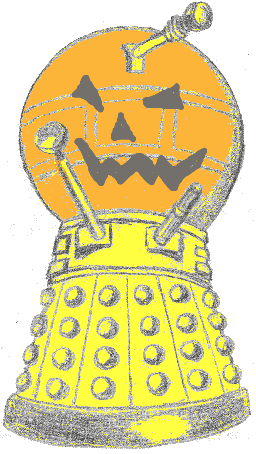Ian found her in the TARDIS library some time later, curled up in an armchair with a paperback.
"Here you are! I've been looking for you for hours."
"Oh, you fibber!" she said, looking at him with mock disapproval. "I saw you with the Doctor, not half an hour ago."
Ian paused, uncertain; the expression on his face was priceless. Barbara
couldn't help herself, and burst out laughing. "You look just like one
of the students caught out lying about why he hasn't handed in his
homework!"
Ian relaxed. "'Of course I know you know we don't have a dog, it must of
bin someone else's dog what et it.' Did you know I once had a girl in
my class who claimed her mother ate her homework? Stuck to her story,
too."
"Amazing, isn't it?" Barbara sobered up. "Sit down, Ian. I want to talk to you."
"Well the reason I've been looking for you is that the Doctor-"
"Hang the Doctor! This is important!
Sit down!"
Ian did so. "Yes, miss. Sorry miss." Barbara didn't smile.
"How long have we been travelling with the Doctor, Ian? A year?"
"Something like that, yes. I'd have to do some totting up to be sure of the exact day count..."
"Don't bother. The thing is, for all that time we've been acting as if
our lives have been on hold, as if we can go back to Coal Hill and pick
up where we left off, just as soon as the Doctor figures out how to get
us there."
"Well, yes, but-"
"It's not going to happen, Ian! Even if he takes us back to the day
after we left there's going to be an awful stink over Susan
disappearing, and someone's bound to have seen us on the way to Totter's
Lane. If it's any later than that - well, I don't know what will
happen. And that's the point.
"Here and now we have a life, in the TARDIS. I've barely scratched the
surface of what it's possible to do here, because I've been waiting.
Waiting for an old life to return, one that never will. And so have you.
It's time we stopped waiting."
They were both silent for a while, processing. Ian spoke up first. "I never planned to be a teacher, you know."
"I'm sorry?"
"I was going to go into research, be a 'proper' scientist. But National
Service came along at the wrong moment for me. By the time I got out,
teaching just seemed like the easier option."
"You're very good at it. All the pupils love you."
Ian smiled. "Quite an exaggeration, but thanks. Yes, it worked out okay.
I was just thinking, though, that it might not be so bad for me, if I
had to quit. It might be the spur I need to pursue my original dream.
But you - well, what would you do?"
Barbara stood up, paced slowly back and forth for a while. Ian waited
patiently. "I don't know. Truly. Things were... complicated before I
came to Coal Hill, so it felt like a bit of a fresh start. It's going to
be hard, whatever happens. I love teaching, but after all this I feel
like - well, like I could do with a trial run, get a temporary job
somewhere, get a feel for it again. That's assuming we ever land
somewhere not fraught with peril, of course."
"'Fraught with peril,' eh? With a vocabulary like that maybe you should try teaching English as a foreign language."
"Or as an alien language." Barbara sat back down. "We're at it again,
though. Planning everything around a return home. I want to break that
habit, think of the here and now! It may not have been our choice to
travel with the Doctor, but it's a fantastic opportunity. When - if -
no, when we get home, I don't want to look back and regret not making
more of it." She picked up the book she'd been reading. "Take this, for
instance. It's about a boy who finds himself suddenly thrust into a
world that is so much bigger than he's used to.
He doesn't spend
all his time thinking about where he came from - quite the contrary. He
revels in the discovery, and allows himself to grow. That's what we
should be doing."
Ian came over and perched on the arm of Barbara's chair. "I think - I
think in some ways, we have grown. Or changed, at least." He looked down
at her. "I'd like to believe you thought so too?"
Barbara smiled, warmly, but said nothing; Ian continued. "You're right,
though. I have been clinging a bit too tightly to that hope of return.
I'll try to spend more time in the present. You'll probably have to
remind me, though."
"Only if you remind me too."
"Deal?"
"Deal."
They paused again, looking at each other, each wondering what to say
next. This time it was Barbara who broke the silence. "I suppose we'd
better go catch up with the Doctor, then."
"I suppose we better had."
They both rose, and headed for the corridor. Ian idly picked up the book
Barbara had been reading. "Rowling, eh? Never heard of him. Is he any
good?"
"I'll let you know when I've read a bit more."
And then they were through the doorway, and once again there was silence in the TARDIS library.
Next Time:
The Web Planet.
